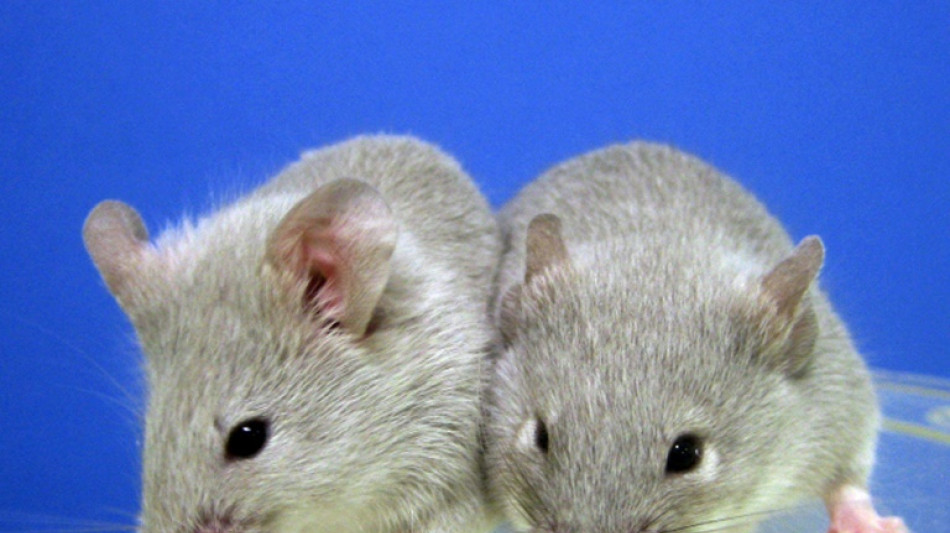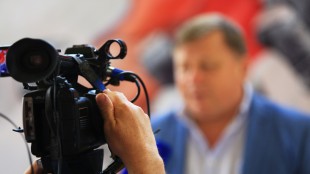
-
 Lewandowski injury confirmed in blow to Barca quadruple bid
Lewandowski injury confirmed in blow to Barca quadruple bid
-
Russia and Ukraine accuse each other of breaching Easter truce

-
 Zimbabwe bowl Bangladesh out for 191 in first Test in Sylhet
Zimbabwe bowl Bangladesh out for 191 in first Test in Sylhet
-
Ukrainians voice scepticism on Easter truce

-
 Pope wishes 'Happy Easter' to faithful in appearance at St Peter's Square
Pope wishes 'Happy Easter' to faithful in appearance at St Peter's Square
-
Sri Lanka police probe photo of Buddha tooth relic

-
 Home hero Wu wows Shanghai crowds by charging to China Open win
Home hero Wu wows Shanghai crowds by charging to China Open win
-
Less Soviet, more inspiring: Kyrgyzstan seeks new anthem

-
 Defending champion Kyren Wilson crashes out in first round of World Snooker Championship
Defending champion Kyren Wilson crashes out in first round of World Snooker Championship
-
NASA's oldest active astronaut returns to Earth on 70th birthday

-
 Exec linked to Bangkok building collapse arrested
Exec linked to Bangkok building collapse arrested
-
Zelensky says Russian attacks ongoing despite Putin's Easter truce

-
 Vaibhav Suryavanshi: the 14-year-old whose IPL dream came true
Vaibhav Suryavanshi: the 14-year-old whose IPL dream came true
-
Six drowning deaths as huge waves hit Australian coast

-
 Ukrainian soldiers' lovers kept waiting as war drags on
Ukrainian soldiers' lovers kept waiting as war drags on
-
T'Wolves dominate Lakers, Nuggets edge Clippers as NBA playoffs start

-
 Taxes on super rich and tech giants stall under Trump
Taxes on super rich and tech giants stall under Trump
-
Star Wars series 'Andor' back for final season

-
 Neighbours improvise first aid for wounded in besieged Sudan city
Neighbours improvise first aid for wounded in besieged Sudan city
-
Tariffs could lift Boeing and Airbus plane prices even higher

-
 Analysts warn US could be handing chip market to China
Analysts warn US could be handing chip market to China
-
Unbeaten Miami edge Columbus in front of big MLS crowd in Cleveland

-
 Social media helps fuel growing 'sex tourism' in Japan
Social media helps fuel growing 'sex tourism' in Japan
-
'Pandora's box': alarm bells in Indonesia over rising military role

-
 Alaalatoa hails 'hustling hard' Brumbies for rare Super Rugby clean sheet
Alaalatoa hails 'hustling hard' Brumbies for rare Super Rugby clean sheet
-
Trio share lead at tight LA Championship

-
 Sampdoria fighting relegation disaster as old heroes ride into town
Sampdoria fighting relegation disaster as old heroes ride into town
-
Recovering pope expected to delight crowds at Easter Sunday mass

-
 Nuggets edge Clippers in NBA playoff overtime thriller, Knicks and Pacers win
Nuggets edge Clippers in NBA playoff overtime thriller, Knicks and Pacers win
-
Force skipper clueless about extra-time rules in pulsating Super Rugby draw

-
 DEA MARIJUANA SCAM: As DEA Cannabis Program Implodes This 4/20, MMJ Stands Alone in Pursuit of Real Medicine
DEA MARIJUANA SCAM: As DEA Cannabis Program Implodes This 4/20, MMJ Stands Alone in Pursuit of Real Medicine
-
Nuggets edge Clippers in NBA playoff overtime thriller, Pacers thump Bucks

-
 Unbeaten Miami edge Columbus in front of big crowd in Cleveland
Unbeaten Miami edge Columbus in front of big crowd in Cleveland
-
Kim takes one-shot lead over Thomas, Novak at RBC Heritage

-
 Another round of anti-Trump protests hits US cities
Another round of anti-Trump protests hits US cities
-
'So grateful' - Dodgers star Ohtani and wife welcome first child

-
 PSG maintain unbeaten Ligue 1 record, Marseille back up to second
PSG maintain unbeaten Ligue 1 record, Marseille back up to second
-
US, Iran report progress in nuclear talks, will meet again

-
 US Supreme Court intervenes to block Trump deportations
US Supreme Court intervenes to block Trump deportations
-
Hamas armed wing says fate of US-Israeli captive unknown

-
 Pacers thump Bucks to open NBA playoffs
Pacers thump Bucks to open NBA playoffs
-
Sabalenka reaches Stuttgart semis as Ostapenko extends Swiatek mastery

-
 Zelensky says Ukraine will observe Putin's Easter truce but claims violations
Zelensky says Ukraine will observe Putin's Easter truce but claims violations
-
'Fuming' Watkins fires Villa in bid to prove Emery wrong

-
 DR Congo boat fire toll revised down to 33
DR Congo boat fire toll revised down to 33
-
England thrash Scotland to set up France Grand Slam showdown

-
 Verstappen's Red Bull 'comes alive' to claim record pole in Jeddah
Verstappen's Red Bull 'comes alive' to claim record pole in Jeddah
-
McTominay fires Napoli level with Inter as Conte fuels exit rumours

-
 Rajasthan unleash Suryavanshi, 14, as youngest IPL player but lose thriller
Rajasthan unleash Suryavanshi, 14, as youngest IPL player but lose thriller
-
Man City boost top five bid, Aston Villa thrash in-form Newcastle


'Revolutionary': Scientists create mice with two fathers
Scientists have created eggs using the cells of male mice for the first time, leading to the birth of seven mice with two fathers, according to research Wednesday hailed as "revolutionary".
The technique pioneered in the proof-of-concept experiment is a long way from potentially being used in humans, with obstacles including a low success rate, adaptation concerns and wide-ranging ethical considerations.
But the breakthrough raises the prospect of a raft of new reproductive possibilities, including that gay male couples -- or even a single man -- could have a biological child without needing a female egg.
The research, published in the journal Nature, was carried out by a team of scientists in Japan led by developmental biologist Katsuhiko Hayashi of the Osaka and Kyushu universities.
Hayashi and his team previously found a way to take skin cells from a female mouse and transform them into an egg that could be used to give birth to healthy pups.
For their latest research, the team aimed to do the same for male cells.
Just like humans, male mice have both an X and Y chromosome, while females have two X chromosomes.
The scientists took skin cells from the tail of a male mouse and, in a dish, turned them into what are called induced pluripotent stem cells, which can become any type of cell.
During this process around six percent of the cells lost their Y chromosome, leaving only an X chromosome -- meaning they were what is known as XO.
Using a fluorescent protein and a drug called reversine, the researchers managed to duplicate the existing X chromosome in these cells, creating an XX set.
- One percent success rate -
The cells were then used to create eggs, which were fertilised with the sperm of a different male mouse and implanted into the uteruses of surrogate female mice.
Out of 630 attempts, seven pups were born, representing a success rate of just over one percent.
The pups do not show any sign of abnormalities and are fertile themselves, the study said.
Hayashi, who first presented the findings at the Third International Summit on Human Genome Editing in London last week, warned that many obstacles remained before the technology could be used for humans.
"There is a big difference between a mouse and a human," he told the summit.
Nitzan Gonen, the head of the sex determination laboratory at Israel's Bar-Ilan University, told AFP that it was a "revolutionary paper", while cautioning that there was a long way to go.
Theoretically, the technique could allow two same-sex male partners to have a baby, one providing the sperm and the other the egg, said Gonen, who was not involved in the research.
One man could even provide both the sperm and the egg, which Gonen said could be "a bit more like cloning, like what they did with Dolly the sheep".
- 'Milestone' -
Jonathan Bayerl and Diana Laird, stem cell and reproductive experts at the University of California, San Francisco, said it was not yet known if the process would even work with human stem cells.
Nonetheless, the research marks "a milestone in reproductive biology", they commented in Nature.
One potential future application could be to bring an endangered species with only one surviving male back from the brink, provided there was a suitable female surrogate from another species, they said.
But Gonen warned that the process was currently "extremely inefficient", with 99 percent of the embryos not surviving.
And while pregnancy takes only three weeks in mice, it lasts nine months in humans, creating much more time for something to go wrong, she added.
If she had to guess, Gonen estimated that "scientifically speaking" the technique could be ready for humans in around 10 to 15 years.
But that did include the time it could take to wade through the ethical considerations that may arise, she added.
"The fact that we can do something does not necessarily mean we want to do it -- especially when we are talking about a new human being."
O.M.Souza--AMWN



